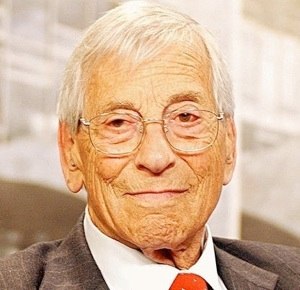Great Throughts Treasury
This site is dedicated to the memory of Dr. Alan William Smolowe who gave birth to the creation of this database.

Richard Neustadt, fully Richard Elliott Neustadt
American Historian, Political Scientist specializing in the United States Presidency, Advisor to Presidents Harry S. Truman, John F. Kennedy and Lyndon B. Johnson, Author
"Drastic action may be costly but it can be less expensive than continuing inaction."
"Persuasion deals in the coin of self-interest."
"The men who share in governing this country are inveterate observers of a President. They have the doing of whatever he wants done. They are the objects of his personal persuasion. They also are the most attentive members of his audience. These doers comprise what in spirit, not geography, might well be termed the "Washington community." This community cuts across the President's constituencies. Members of Congress and of his Administration, governors of states, military commanders in the field, leading politicians in both parties, representatives of private organizations, newsmen of assorted types and sizes, foreign diplomats (and principals abroad)--all these are "Washingtonians" no matter what their physical location. In most respects the Washington community is far from homogeneous. In one respect it is tightly knit indeed: by definition, all its members are compelled to watch the President for reasons not of pleasure but vocation."
"Presidents and other decision makers usually get the intelligence they want. This doesn't mean that intelligence reports should be ignored, but that they must be viewed with skepticism."
"In the United States we like to "rate" a President. We measure him as "weak" or "strong" and call what we are measuring his "leadership." We do not wait until a man is dead; we rate him from the moment he takes office. We are quite right to do so. His office has become the focal point of politics and policy in our political system. Our commentators and our politicians make a specialty of taking the man's measurements. The rest of us join in when we feel "government" impinging on our private lives. In the third quarter of the twentieth century millions of us have that feeling often."
"A President's persuasiveness with other men in government depends on something more than his advantages for bargaining. The men he would persuade must be convinced in their own minds that he has skill and will enough to use his advantages. Their judgment of him is a factor in his influence with them."
"The Washingtonians who watch a President have more to think about than his professional reputation. They also have to think about his standing with the public outside Washington. They have to gauge his popular prestige. Because they think about it, public standing is a source of influence for him, another factor bearing on their willingness to give him what he wants.Prestige, like reputation, is a subjective factor, a matter of judgment. It works on power just as reputation does through the mechanism of anticipated reactions. The same men, Washingtonians, to the judging. In the case of reputation they anticipate reactions from the President. In the instance of prestige they anticipate reactions from the public. Most members of the Washington community depend upon outsiders to support them or their interests. The dependence may be as direct as votes, or it may be as indirect as passive toleration. Dependent men must take account of popular reaction to their actions. What their publics may think of them becomes a factor, therefore, in deciding how to deal with the desires of a President. His prestige enters into that decision; their publics are part of his. Their view from inside Washington of how outsiders view him thus affects his influence with them."
"Academic politics is much more vicious than real politics. We think it?s because the stakes are so small."
"Effective influence for the man in the White House stems from three related sources: first are the bargaining advantages inherent in his job with which to persuade other men that what he wants of them is what their own responsibilities require them to do. Second are the expectations of those other men regarding his ability and will to use the various advantages they think he has. Third are those men's estimates of how his public views him and of how their publics may view them if they do what he wants. In short, his power is the product of his vantage points in government, together with his reputation in the Washington community and his prestige outside."
"A President, himself, affects the flow of power from these sources, though whether they flow freely or run dry he never will decide alone. He makes his personal impact by the things he says and does. Accordingly, his choices of what he should say and do, and how and when, are his means to conserve and tap the sources of his power. Alternatively, choices are the means by which he dissipates his power. The outcome, case by case, will often turn on whether he perceives his risk in power terms and takes account of what he sees before he makes his choice. A President is so uniquely situated and his power so bound up with the uniqueness of his place, that he can count on no one else to be perceptive for him."